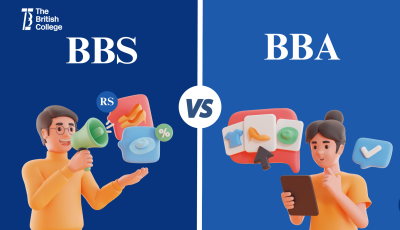The Importance of A Levels for Higher Studies

The Importance of A Levels for Higher Studies
There are many different types of qualifications you can take in order to progress to higher education - so when choosing it can be difficult. A lot of colleges in Nepal offer the Plus 2 (HCE) qualification - however, BTEC, International Baccalaureates, level 3 diplomas and much more are also available.
So with so much on offer, why choose A Levels?
In short, A Levels are the most widely respected and accepted qualification if you want to go to University. So we have put together our top 10 reasons why A Levels are the best way to accelerate you to success - to help make your decision that bit easier.
1. Structure and flexibility
So first things first, what are A Levels? A levels are studied across two years, the first year being your AS and your second being A2. You are usually recommended to study 4 subjects at AS level, with many progressing with just 3 to A2. Unlike other courses, this means you can study a number of different subjects without restricting yourself and have time to recess in the second year. Additionally - this variety of knowledge looks great on your application for university and shows them that you are prepared to diversify.
2. Guided Subject Selection
With A Levels there is an amazing selection of subjects - including ones you will never have had the chance to study before. When it comes to choosing those subjects, Colleges such as The British College will help you to decide which path you would like to progress on in the future - whether this be arts, science, languages or anything else - and their expert team will help you to group together specialized subjects that complement each other and give you the best chance of getting onto the course you want at university.
3. Exam Based
A lot of qualifications are assessed throughout your two years of study, with coursework and presentations contributing to your overall grade. However, as of recently, the A level grade is based solely on the final exams at the end of the two years. This is a great bonus to those who work well under pressure and thrive in exams - and while it may seem daunting for those who don’t favour exams, this could also work in your favour. It means you are only assessed once you have had 2 full years of teaching, have chosen your final subjects and are completely dedicated - giving you the best chance of getting top results!
4. Skills Learnt
A Levels are not only a great way to prepare for University because of the qualifications and knowledge gained. Students also take A levels because they are a great introduction to the study habits required by UK universities because they have been designed as university entrance exams. Furthermore, this skill set is understood and recognised by universities - making those with A level qualifications stand a higher chance of gaining entry to their top choice.
5. Entry into UK Universities
Although UK universities do accept other entrance qualifications, A levels are undoubtedly favoured. This is reflected in the fact that with A levels you are not required to take any foundation courses and can go straight into your degree. A levels are also the preferred entry qualification for many top UK universities such as Oxford and Cambridge and as such taking A levels demonstrates your commitment to securing a place at a top institution.
6. Entry to Universities outside of the UK
A levels are recognised by prestigious universities around the world, and they provide a great advantage if you are looking to move to an English-speaking country, such as Australia, the USA or Canada. Studying and taking exams in English shows that you are ready to move and keep up with the pace of learning in a second language.
7. Progression Opportunities Outside of the University
A Levels are often associated with university entry - however, A levels actually give you lots of progression opportunities. If you are not sure about starting university - but are not ready to finish studying, then you could opt for a foundation degree, a higher national diploma, or a higher national certificate. They are only 2 years old and give you the option to top up to a full degree if you choose later, without having to start again from scratch or commit straight away.
8. Career Development
Even once you have a degree, many job applications still require you to write your qualifications prior to university - and A levels always stand out on your resume. Alternatively, you can go straight into work as having A levels as a qualification on your CV will be a huge advantage - and all the skills you learn throughout the course will help to prepare you for your chosen career. They are also a great way to demonstrate consistent performance and your ability to meet international standards of excellence - so whether you are working between studying or as an alternative to studying, they can provide a great boost.
9. Plus 2 or A levels?
Many schools in Nepal offer the Plus 2 ( HSC / The Higher Secondary Certificate) as an alternative to A Levels and it can be difficult to choose between them. The structure, subjects available and grading system are all different - with one of the key differences with HSC being that you must take 4 subjects in different fields i.e. you can not take two mathematics-based subjects. The style of learning is also different with A Levels generally being considered to be more challenging and therefore regarded more highly - which is why you will often see A levels as the recommended route of study for University entry.
10. Qualification Recognition
One of the key differences between A-Levels and other similar qualifications - and why it really is so important for higher studies - is the way in which it is recognised. HSC has been criticised for the widespread disparity in examination standards, whereas A Levels are recognised globally as having one set international standard. This makes it far more attractive on applications and increases your chance of progressing to the higher studies of your choice.
When considering higher education, the choice of A Level colleges in Nepal is crucial. Among them, The British College stands out as the top institution for A Levels, offering a robust curriculum designed to prepare students for university success. With a commitment to academic excellence, TBC provides a diverse range of subjects, allowing students the flexibility to tailor their studies to their interests and career aspirations.
Students at TBC benefit from a supportive learning environment and personalized guidance from experienced faculty. This ensures that whether you're passionate about sciences, arts, or business, you can select subjects that align with your future goals. The college emphasizes critical thinking and independent learning, essential skills for higher education.
Moreover, the recognition of A Levels globally adds significant value to your qualifications, opening doors to prestigious universities both in the UK and abroad. With an emphasis on exam-based assessment, students can focus their efforts on mastering their chosen subjects over the two-year program. Choosing The British College for your A Levels not only enhances your academic profile but also sets you on a clear path toward achieving your higher education dreams. For anyone exploring A Level colleges in Nepal, TBC is undoubtedly the best choice.
Still confused or have questions? Then just get in touch! Our helpful team will be happy to tell you all there is to know about A levels, including the subjects we offer at The British College and the requirements you need to gain entry.
FAQs About A levels
1. What are A Levels?
👉 A Levels are internationally recognized qualifications that students typically take over two years. They provide flexibility in subject selection and are highly regarded for university admissions.
2. Why should I choose A Levels over Plus 2?
👉 A Levels offer more flexibility in subject choices and are considered more rigorous, making them preferred by many universities for admission.
3. How do A Levels help with university admission?
👉 A Levels are widely accepted by universities globally, especially in the UK, and demonstrate a student's readiness for higher education.
4. What subjects can I choose in A Levels?
👉 British Model College offers a diverse range of subjects, including sciences, humanities, and arts, allowing students to tailor their education to their interests.
5. Are A Levels recognized internationally?
👉 Yes, A Levels are recognized by prestigious universities worldwide, making them an excellent option for students considering studying abroad.
6. What is the assessment structure for A Levels?
👉 A Levels are assessed through final exams at the end of the two-year program, allowing students to focus their efforts on mastering their subjects.
7. Can I pursue a career with just A Levels?
👉 Yes, A Levels are valuable qualifications that can enhance your CV and are recognized by employers, providing various career opportunities.
8. What support does The British College provide for A Level students?
👉 The college offers personalized guidance from experienced faculty, helping students choose subjects and prepare for university applications.
9. What are the costs associated with A Levels in Nepal?
👉 A Levels at The British College are competitively priced compared to other international qualifications, making them a cost-effective option for higher studies.
10. How do I apply for A Levels at The British College?
👉 Prospective students can contact the college directly or visit the campus to learn more about the application process and available programs.










